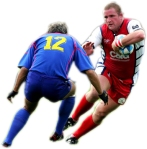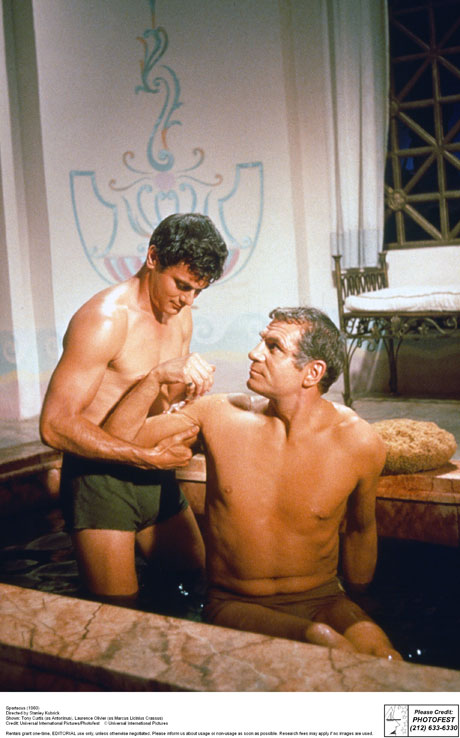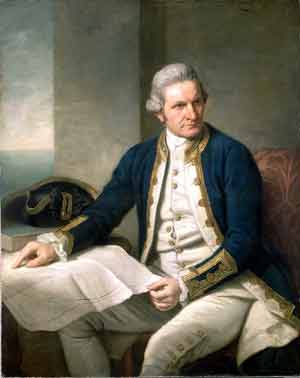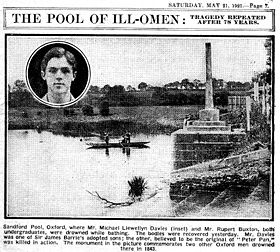November 2008
November 29, 2008
November 27, 2008
This article pays homage to a place where sense of fashion coicides with uncompromising rugby; Stade Francais, the team which sneers at suggestions of effeminacy. Any players who can go into a rolling maul wearing this kit
Normally rugby teams huff and puff onto the pitch looking incredibly butch and rugged, wearing this sort of shirt.
 Sensible, isn’t it? The nearest the English teams get to exotic are the wonderful old Harlequins strip
Sensible, isn’t it? The nearest the English teams get to exotic are the wonderful old Harlequins strip
 although an honourable (or is that dishonourable?) mention should be made for the Gloucester kit of a couple of seasons back, the side panels of which seemed inspired either by Liz Hurley’s infamous safety pin dress or some sort of bondage theme.
although an honourable (or is that dishonourable?) mention should be made for the Gloucester kit of a couple of seasons back, the side panels of which seemed inspired either by Liz Hurley’s infamous safety pin dress or some sort of bondage theme.
 So it’s across the channel we must go to encounter the truly daring kit, the shirts which only a real man could get away with wearing.
So it’s across the channel we must go to encounter the truly daring kit, the shirts which only a real man could get away with wearing.
 Now it has to be said that Stade isn’t without its share of pulchritude, which adds to the general pleasure and means that the Cochrane household is filled with shouts of joy when it’s a Heineken Cup weekend and “Stade are on the box!”
Now it has to be said that Stade isn’t without its share of pulchritude, which adds to the general pleasure and means that the Cochrane household is filled with shouts of joy when it’s a Heineken Cup weekend and “Stade are on the box!”
 I mean, who wouldn’t want to spend a couple of hours in the televisual company of these guys?
I mean, who wouldn’t want to spend a couple of hours in the televisual company of these guys?
 Imagine them in this kit and it gets even better. This season they have excelled themselves, opting for a home strip which features Andy Warhol type images of Blanche de Castille, the wife of Louis VIII.
Imagine them in this kit and it gets even better. This season they have excelled themselves, opting for a home strip which features Andy Warhol type images of Blanche de Castille, the wife of Louis VIII.
No, your eyes don’t deceive you.
Pretty, eh?
Other sports please take note: wearing pink makes a man neither gay nor effeminate. Try spouting that argument in a Paris bar after the match…
November 25, 2008
Romantic Novelists Association
Posted by Alex Beecroft under Alex Beecroft, historical romance, romance, writing[6] Comments
November 18, 2008
More on the Joy of Original Sources
Posted by Alex Beecroft under Alex Beecroft, Georgian, history[8] Comments
There are lots of modern myths about the past which it’s very easy for us as modern people to buy into. I was thinking about this today because I’ve recently acquired a number of reprints of 18th Century journals, and I keep coming across sentiments which are startlingly at odds with what popular thought believes about 18th Century people.
We’re accustomed to the idea that the past was a different place from the present – that people thought in ways which are at odds with our modern understanding – but I think that our tendency is to make that a value judgement. The people of the past were old fashioned and wrong. They believed things which no progressive modern person would ever believe. They were, in short, not as good as us.
One of the joys of reading original sources, however, is the way that they challenge this assumption. Yes, the past was different from the present, but it was often different in ways we don’t really suspect, and in ways that challenge our casual assumption of modern superiority.
For example, the idea that women in the past were somehow less critical of men; they were passive wallflowers without a thought of their own, in comparison with modern, kickass heroines.
By contrast I just found this opinion in the correspondence of Mary Delany (published as ‘Letters from Georgian Ireland’ edited by Angelique Day)
Dublin 17 January 1731/2
Would it were so, that I went ravaging and slaying all odious men, and that would go near to clear the world of that sort of animal; you know I never had a good opinion of them, and every day my dislike strengthens; some few I will except, but very few, they have so despicable an opinion of women, and treat them by their words and actions so ungenerously and inhumanly. By my manner of inveighing, anybody less acquainted with me than yourself would imagine I had very lately received some very ill usage. No! ’tis my general observation on conversing with them: the minutest indiscretion in a woman (though occasioned by themselves), never fails of being enlarged into a notorious crime; but men are to sin on without limitation or blame; a hard case!
It’s a complaint I hear daily echoed around my Livejournal communities, and so startlingly familiar that I laughed out loud. Who would have thought it – we’ve been complaining about the double standard for over two hundred years. Of course, in the next line she breaks that familiarity by continuing – not the restraint we are under, for that I extremely approve of, but the unreasonable licence tolerated in the men. How amiable, how noble a creature is man when adorned with virtue! But how detestable when loaded with vice!
These days we would rather argue for the right of women to behave with the licence she detests in her men, rather than the duty of men to behave with the self restraint she hopes for in women, but still it’s apparent that our foremothers were not quite as uncritical as they are sometimes supposed to be.
Another myth that doesn’t quite stand up to the evidence of the original sources is the idea that the 18th Century explorers went out with a doctrine of Imperialism and certainty of superiority, intent on dispossessing the peoples they found of their culture and lands.
With hindsight developed from watching the ghastly results of that first contact, we work backwards and assign the original explorers motives and world-views that are quite inaccurate. In doing so – in our haste to make it plain that as modern people we abhor imperialism in any form – we misrepresent the attitudes of the time.
This is Captain Cook exhibiting his feeling of cultural superiority in Tahiti
We refused to except of the Dog as being an animal we had no use for, at which she seem’d a little surprised and told us that it was very good eating and we very soon had an opportunity to find that it was so, for Mr.Banks having bought a basket of fruit in which happened to be the thigh of a Dog ready dress’d, of this several of us taisted and found that it was meat not to be dispised and therefore took Obarea’s dog and had him immidiatly dress’d by some of the Natives in the following manner. (Cook describes cooking in a hole in the ground.) after he had laid here about 4 hours the Oven (for so I must call it) was open’d and the Dog taken out whole and well done, and it was the opinion of every one who taisted of it that they Never eat sweeter meat, we therefore resolved in the future not to despise Dogs flesh.
Cook on the superiority of Christianity to Tahitian religion:
Various were the opinions concerning the Provisions &c laid out about the dead; upon the whole it should seem that these people not only beleive in a Supream being but on a futurue state also, and that this must be meant either as an offering to some Deitie, or for the use of the dead in the other world, but this last is not very probable as there appear’d to be no Priest craft in the thing, for what ever provisions were put there, it appear’d very plain to us that there it remaind untill it consum’d away of it self. It is most likely that we shall see more of this before we leave the Island, but if it is a Religious ceremoney we may not be able to understand it, for the Misteries of most Religions are very dark and not easily understud even by those who profess them.
My emphasis added. Do these sound to you like the opinions of a man certain that he was the spearhead of civilization? I’m not for a moment denying that his arrival in many of the places he visited was the start of a disastrous and appalling period of exploitation and oppression. Nor that the Imperialism and cultural superiority followed, but the myth tends to be that the first explorers arrived with ill intent. When you read the man’s actual thoughts it’s much harder to keep hold of that.
Cook is not what you expect. And he’s not what you expect in a different way from what you might expect, because although many of his entries read with an almost Star Trek ‘strange new worlds’ delight in discovering new things which I for one find easy to empathize with, in many other places he is as archaic and strange as you can imagine. Here’s his entry in the log for a tragedy early in the voyage:
In the morning hove up the Anchor in the Boat and carried it out to the Southward, in heaving the Anchor out of the Boat Mr Weir Masters mate was carried over board by the Buoy-rope and to the bottom with the anchor. Hove up the anchor by the Ship as soon as possible and found his body intangled in the Buoy-rope. Moor’d the ship with the two Bowers in 22 fathom water, the Loo Rock W and the Brazen head E Saild his Majestys ship Rose. The Boats imploy’d carrying the casks ashore for Wine and the caulkers caulking the Ships sides.
As modern people we would expect at least a conventional expression of emotion here, but there is none.
To sum up; the past is strange, but it’s strange in ways that we don’t expect. If it’s possible at all to find original sources there is no substitute for them in correcting the assumptions we take for granted as modern people. In many respects, once we start to hear the genuine voices of people from the past it becomes much clearer that we aren’t superior to them; that we, like them, are subject to our own culture’s prejudices. Original sources – there’s nothing like them for broadening the mind and the sympathies. (And in Cook’s case, also the spelling. I’m going to have such trouble not writing clowdy and intangled in future!)
November 13, 2008
Random Facts from Everyday life in the 1800s
Posted by Erastes under costume, history, Resources[12] Comments
A Writer’s Guide to Everyday Life in the 1800’s
A book that I’d bought for my Regency research, only to find that it is all about America in the 1800’s. However – it’s none the less fascinating for that!

1. Bang-up – An overcoat
1842: A gentleman dressed in a dark colored fashionable bang-up with a tight-bodied coat, neck-cloth, breast pin, hair and whiskers to match. Philadelphia Spirit of the Times, January 13 1842
“That gentlemanly looking man in the snuff-coloured bang-up: that’s Mayor Scott; he’s the very man.”
“How so?” cried a tall strapping fellow in in a white bang up. Philadelphia Spirit of the Times, January 28 1842
Not sure if this coat pictured is a “bang-up” but I’m guessing it’s close.
2. Turkey: eaten throughout the century.
 1890: The turkey should be cooped up and fed sometime before Christmas. (Well, that would be useful..Erastes) Three days before it is slaughtered, it should have an English walnut forced down its throat three times a day, and a glass of sherry once a day. The meat will be deliciously tender, and have a fine nutty flavor. Mrs Stephen J Field, Statesman’s Dishes and How to Cook them.
1890: The turkey should be cooped up and fed sometime before Christmas. (Well, that would be useful..Erastes) Three days before it is slaughtered, it should have an English walnut forced down its throat three times a day, and a glass of sherry once a day. The meat will be deliciously tender, and have a fine nutty flavor. Mrs Stephen J Field, Statesman’s Dishes and How to Cook them.
What surprises me about this, is that to import English walnuts and real sherry would make this a really expensive dish. Apparently, the marinade had not yet caught on!
3. F.F.V. First Families of Virginia, of which many claimed to be members to gain special treatment, but eventually used in jest.
1850: He was the first of his race to acknowledge that he was not an FFV – Odd Leaves p178
1857: Mr Floyd, as everybody kows, as an FFV and the sould of honor accordingly. Harper’s Weekly.
1861: They must do better down in Virginia than they have done, or FFV., Instead of standing for First Families of Virginia, will get to mean the Fast Flying Virginians. Oregon Argus August 10.
Ah. Influence, it never changes…
4, Bloke Buzzer. A pickpocket who specializes in picking the pockets of men only. (Moll buzzer being one that specializes in women only)
5. Xs and Vs – Ten and Five dollar bills. Fives were also called V-spots.
1837:My wallet was distded with Vs and Xs to its utmost capacity. Knickerbocker Magazine. January 1837
6. Hard Times Tokens: a broad category that includes Civil War tokens (copperheads) Jackson cents, merchants’ tokens or storecards etc from around 1830-1845 and again during the American Civil War, from 1860-1865, by private individuals and busiensses to help make up for the severe coin shortage due to hoardings. Most tokens were about the size of a lardge cente (an oversixed copper cent) and made of copper. They largely served as cents, although they legally called not be so called.
7. Brogans: heavy ankle-high work shoes, available ready-made and mass produced from the 1830s on. Slave brogans were purchased by the barrelful by Southern plantations.
1860s: Experience soon demonstrated that boots were not agreeable on a long march. They were heavy and irksome…good strong brogues or brogans, with broad bottoms and big, flat heels, succeeded the boots, and were found much more comfortable and agreeable, easier put on and off, and altogether more sensible. Carlton McCarthy, Detailed Minutiae of Soldier Life, p20
8. Squaw Horse: A cowboy term for a useless horse. (hey! UNPC Cowboys!!)
9. lamp posts: Civil War soldiers described artillery shells in flight as flying lamp posts because to the naked eye they looked like elongated blurs.
Yeah. I don’t get it, either.
10. Pea-jacket: a Short, heavy, seaman’s jacket. (that’s seaMAN’S). Also worn by boys from 1850 onwards.
This post has been brought to you by the useless information brigade!
November 11, 2008
Who do you think you are then, Long John Silver?
Posted by charliecochrane under Charlie Cochrane, history[4] Comments
Have you ever read the book (or seen the excellent television adaptation) about the beautiful but doomed Hugh Lygon (or is it Alastair Graham?) son of the exiled William Lygon. What about those wonderful detective novels featuring Eric Whelpton, or the ones with the penetratingly clever Dr Joseph Bell? No? Bet you have. I can’t believe you haven’t come across Sebastian Flyte or Peter Wimsey or Sherlock Holmes; I guess it’s just their ‘originals’ which confused the situation.
Many authors use their friends (or historical figures) as inspiration for their characters, perhaps influenced by their appearance, adventures, something unusual they’ve said or done. It’s nothing new – even Shakespeare is said to have based Yorick on Richard Tarlton. Certain authors seem to have made a habit of putting their friends into their stories – I’d have been very wary of getting too pally with Evelyn Waugh, you’d have been almost bound to end up in one of his books.
Some larger than life figures seem to inspire many fictional equivalents; Jack Aubrey, Horatio Hornblower and Captain Savage have all replicated Thomas Cochrane’s exploits.
Rupert Brooke has spawned a host of characters – including the March brothers in E M Forster’s unfinished Arctic Summer – as have Winston Churchill and W H Auden. Jane Austen modelled Captain Harville on her brother Francis Austen, and Lady Mary Wortley Montagu turning down Alexander Pope’s advances may have led him to depict her as Sappho.
Most of us know that Alice in Wonderland was Alice Liddell or that the Llewelyn Davies boys were the inspiration for Peter Pan and the Darling children, but the thing which excites me is finding little known gems like this. Did you know that it was Long John Silver’s (W E Henley’s) daughter calling J M Barrie ‘my fwendy’ instead of ‘my friendy’ which led to his creating the name Wendy. And that the man who inspired ‘Just William’ served in WWII under ‘Biggles’.
I wonder how people feel to be captured for posterity in a certain way. Do the people who visit Alice Liddell’s grave in Lyndhurst always think of that little girl in smock and pinafore, chasing white rabbits, rather than Mrs Hargreaves, mother of three sons, two of whom died in the great war? William Lygon wasn’t exiled because, like Lord Marchmain, he took a mistress – it was his interest in those of his own sex which led to his disgrace and social banishment. Perhaps for both of these characters it’s better to be remembered as their literary equivalents?
I think this particularly applies to the Llewelyn Davies family, pictured forever as contented parents, adventurous children and their strange, perennially young companion Peter Pan, whether we imagine them in their Disney version or the slightly harsher version in the play/book. The truth, played out after the characters had been immortalised in Barrie’s version, is both sad and strange. The father, Arthur Llewelyn Davies, was dead within three years of the play’s opening (he didn’t predecease it, as ‘Finding Neverland’ depicts) – Sylvia, the mother, died a further three years on. Peter, one of the inspirations for Peter Pan, committed suicide in 1960, George died in WWI and, perhaps most tragic of all, Michael died by drowning in an ‘accident’, which might just have been a suicide pact with Rupert Buxton (they were most likely lovers).
When you see the statue of Peter Pan in Kensington Gardens, you’re looking at Michael. Will you think of the wild boy or the handsome Oxford student? Both elected not to grow up.
I’m indebted to William Amos’ ‘The Originals’ and to Chambers Biographical dictionary for inspiring this piece.
November 8, 2008
Lovely to be here
Posted by charliecochrane under Charlie Cochrane, historical romance, writing[14] Comments
I’m Charlie Cochrane and I’d like to thank you for letting me come here and blether a while. I’m not sure I can do a good job of describing myself; ‘married, three daughters, recently published author of m/m historical romances’ seems a bit bland. Sports mad Shakespeare fan, with a not-so-secret passion for jelly babies and handsome men, fills in the portrait a bit more. Add to that the constant rejoinder of “Mother, act your age!” and you’re getting the picture.
If you want to know more, then check out http://www.lindenbayromance.com/newsletter105-2008-11-04.html
or the interview I did here
http://www.myspace.com/lindenbayromance
3rd to 7th November.
If you asked me what would constitute a typical Charlie Cochrane tale, I’d say imagine a black and white film, with two handsome, well dressed young men. Add a dash of humour, some banter, a mention or two of food and sport, a dollop of intrigue and there you have it. But don’t forget that instead of a leading lady to add the love interest, I’ll just settle for those two leading men and the romantic adventures which befall them.

That said, my first published story, Aftermath (part of the Trilogy Speak Its Name with Lee Rowan and Erastes) isn’t so typical. It’s more angsty and a bit darker than the other things I’ve written, although it has a soft spot in my heart as it’s my ‘firstborn’. Hugo Lamont and Edward Easterby definitely fall into the ‘English stiff upper lip leading man’ category and it was interesting to explore how they would react to their mutual attraction, especially in the wake of the first World War, when (does this sound familiar?) some people had blamed the prolongation of the conflict on homosexuals, amongst others.
The plates were bare, the bottle of wine empty and the two young men on the river bank were, too full to attempt another morsel. Hugo lay back on the mossy bank and stared at the blue sky. “Today has certainly turned unseasonably warm for March, Edward, but we won’t complain in case someone hears and does something to rectify it.” Hugo was at last comfortable about using his friend’s Christian name. He’d worried about it all morning, aware that they could not continue with Lamont and Easterby, but knowing it would mean the first level of the defenses that he’d constructed for that first meeting would be breached. There were other walls, other ditches and towers, but the curtain had been broken. He wasn’t sure if he was pleased or not, this was unknown territory.
He looked up. “Come here…no, right next to me so that I can see both you and the sky at the same time.” It was as if he’d spoken his innermost thoughts and he was cross at himself for making so bold a suggestion. Words once spoken can’t be recalled and he shivered as his guest moved closer. Hugo had been very careful, when offering the caviar, not to allow even a cat’s whisker of contact. It had been his next line of defense, along with not mentioning anything personal or too close to the heart. If he could keep this as friendship, then he’d be fine—at least that’s what he kept telling himself.
It would have been terribly easy to simply reach up and draw a line down Edward’s spine. That would have been an undeniable invitation, a statement of intent. Yet Hugo still had no idea whether he wanted to go so far or whether he would want Easterby to accept the invitation if he did. This situation was unique—for once in Lamont’s life desire and friendship had coincided. Perhaps this was even the budding of love, a precious bud that could easily be nipped by the frosts of a rejected pass. The risk of making a move and having it turned down, of then losing a precious acquaintance, was far too great a one to for him to take it lightly.
http://www.lindenbayromance.com/product-trilogyno111speakitsname-7212-145.html
I was very fortunate in being able to collaborate with two such friendly and professional authors. I’ve known Lee since before ‘Ransom’ was published and we’ve always got on well. Early last year she asked me to contribute an historical m/m romance for the ‘Speak Its Name’ trilogy and in a mad moment I agreed. I admit I was a bit in awe of being in tandem with Erastes, who’s established such a reputation with ‘Standish’, but once I got to know her it all became less daunting. If we ever all got to meet up the venue probably wouldn’t be left standing.
The first book in the Cambridge Fellows Mystery series, Lessons in Love has all the hallmarks of a Cochrane tale. Inspired by my love of detective novels, old films, Cambridge and handsome, intellectual men, this story is a romance with a mystery attached, or perhaps vice versa. There’s plenty of romantic interludes, but be warned that I write sensual rather than explicit sex scenes. My two ‘heroes’, Jonty Stewart and Orlando Coppersmith, were created out of many influences; the wonderfully contrasting protagonists in ‘Chariots of Fire’, the characters in ‘Death at the President’s Lodging’, the leading men in the radio dramas of my youth. I also wanted to create an m/m equivalent of Wimsey and Vane or Alleyn and Troy – a couple deeply in love, who also happened to solve mysteries.
“There’s some of that bottle left, Dr. Stewart, if you need something to keep out the cold.” Coppersmith raised an eyebrow in silent plea and his friend nodded his willingness to comply.
“I think that I’m beyond keeping out the cold but I might be able to persuade it to vacate the premises.” Jonty managed a grin, something Orlando could never have done, given the circumstances.
They didn’t speak a word as they crossed the courtyard, making the most of the fellows’ privilege of walking on the grass, despite the snow, which now lay an inch or two deep. The glasses they’d left half empty they now refilled.
“Here you are, Jonty, drive out the chill with this.” Orlando thrust a generous measure of port into Stewart’s hand. It was strange and endearing that Coppersmith had reverted to using his Christian name the minute they’d entered the set of rooms again.
“Thank you, Orlando—it’s been a long night and I guess this is just the beginning of many long days.” Jonty sipped the excellent vintage appreciatively and studied his companion. Coppersmith looked a broken man. It must have been a great shock to him that his nice little academic world had been sullied by something as common and grubby as a strangling. And this had followed directly after his nice little academic world being sullied by a spark of something else—desire, attraction, lust? Who knew what name to give it, but it had been there.
It would have been the easiest thing in the world for Stewart to go over, sit on the arm of Orlando’s chair and put his arm around the man’s shoulders. It certainly would have been simple twenty-four hours ago, but not now—not after whatever strange electricity had crackled between them in this very room a few hours ago. He settled for walking across and clapping Coppersmith on the back. “I’ll see you tomorrow. No, later today I suppose it would be.” He moved to the door, “Will you be all right?” What he meant was would you like me to stay? but that particular thought remained unspoken.
“I’ll be fine, thank you, Jonty.” Coppersmith produced a wan smile. “Thank you for your help tonight—thank you for everything.”
http://www.lindenbayromance.com/product-lessonsinlove-7242-145.html
Unfortunately St. Bride’s college doesn’t exist; it’s an amalgam of a number of colleges, some of which haven’t changed all that much in over a hundred years. By setting the story in that place and time, I can indulge in writing about something else I love, namely sport. Cambridge has always been a great place for games, so I can weave in the odd rugby match to the story; such a great source of angst for the people on the touchline. (In one of the later books in the series, Jonty and Orlando get to play a match against each other. There’s foul play in plenty.)
The next book in the Cambridge Mysteries series comes out on the first of February 2009 and takes the lads away from the comparative safety of the college-Where’s the best place to hide a pair of men who want to be together all the time? In a Cambridge college-to the island of Jersey, where Orlando takes his time coming to grips with keeping their relationship a secret. When a brutal murder occurs at the hotel where they’re staying, and the victim’s son makes a pass at Orlando, their holiday turns into a bit of a nightmare.
I have one more book out at present and that’s firmly in ‘black and white film’ territory, set at the time when Londoners spent every night wondering if it would be their last. This book is a free read, available from links

They never reached the fish and chip shop, the siren sounding before they’d turned the corner. The pair were forced to join the mass of humanity heading for a nearby underground station. Neither man had taken refuge in one before, always having been at their local shelters, and the sheer mass of unfamiliar, frightened humanity distressed Scarborough immensely.
They ended up sitting together, watching and waiting, sharing the odd word or a wan smile, both trying to be brave and gallant; not just in front of the families which huddled around them but in front of each other. This was no time for any display of fearfulness. Gradually they drew nearer, until they were thigh to thigh, arm to arm, and the unease of being underground as the bombers strafed the streets was replaced with the excitement of close physical contact with someone you fancied and daren’t tell. At least not in words which could be spoken here and now.
“Dr. Scarborough…” Adam tried to control the emotion in his voice.
“My name is Hugh, please use it.”
“Hugh. Didn’t you ever wish you were on active service?”
“I wanted to join the navy but my university tutor put me into this line. He said that any fool could sail a frigate, but men with brains—his words, not mine—were a rare commodity. I know that the work we do is vital, but…” Scarborough’s voice petered out, his uncertainty making itself clear. Was the closeness of their bodies distracting his train of thought as it much as it was Adam’s?
“I know.” Jackson sighed. He also couldn’t be sure of a great deal at present, except that he wanted to take Hugh to his bed. He’d felt the same since he’d first set eyes on the man but he needed to make sure he had a realistic chance. “You’d rather be doing something with a uniform to wear and a bit of glamour—and have two land girls hanging off your arm.”
“Something like that. Except for the land girls,” Hugh added, in a voice barely above a whisper and full, to Adam’s ears, of hidden meaning.
http://www.lindenbayromance.com/product-blitz-7262-145.html
It’s been great to be here, although I have to say it’s been far more daunting talking about me than writing my usual blog contributions here. Visit my website
www.charliecochrane.co.uk
or my journal http://charliecochrane.livejournal.com/ for the latest news – feel free to contact me via a comment in the journal or at charlie.cochrane@lindenbayromance.com
November 4, 2008
Loincloths might still be around (roll on global warming) but they have been found in burial sites on the bodies of men living over 7000 years ago. Who knows what sparked man to start covering his bits – it would hardly be warmth, after all. It would offer some level of protection from thistles I suppose, but not if a sabre toothed-tiger was coming at you at groin level.
Tutankhamen was buried with 145 loincloths. This seems either a lot, or not enough, depending on your point of view of how long the afterlife is going to be. Of course by this time, the loincloth was worn under a skirt. Still – roll on global warming.
The Ancient Greeks obviously didn’t have to worry about sabre-toothed tigers, and consequently didn’t wear any underwear at all. Good for them! Φοβάμαι τους Έλληνες όταν είναι πηγαίνοντας καταδρομέας!**
The Romans did, though – big sissies. Possibly because their empire stretched into chillier areas. They’d wear something called a subligaculum, which in modern terms means a pair of shorts or a loincloth and was worn under a toga or tunic.
 Oh yes, I know – probably NOT an accurate picture of underwear but is anyone complaining I’m showing this picture again?
Oh yes, I know – probably NOT an accurate picture of underwear but is anyone complaining I’m showing this picture again?
Pull on undergarments were invented around the 13th century, large baggy drawers called “braies” made from linen were worn by men under their clothes. This style of undergarment did not really change in design for 500 years, other than to be fashioned from better, finer fabrics and to have ornamentation.
They shrank considerable during the Renaissance as the familiar image of cod-piece and hose emerged. The hose themselves were an open garment – not like our tights or hose of today.
Tight on the legs and open at the front and back which could not be worn openly as the privities hung lose. As the doublet became shorter somthing else was needed! The braies shrank to show off the hose, and the codpiece was developed to protect the wearer’s modesty.
Or at least at first.
Gradually the codpiece evolved, became padded, shaped to fit and as some clearly showed were frankly showing off- and obviously exaggerating. Some of the most “impressive”are those belonging to Henry 8th and shown at the Tower of London, where other Crown Jewels are protected too!!
What is interesting is that the fashion of today – that of showing off one’s designer underwear, is not a new thing at all. The rich would commission the most exquisite undershirts,and underwear- fabulously expensive fabrics and meticulously embroidered. Why, they reasoned, am I paying for such incredible work that will never be seen? This led to the “slashing” fashions that we see in the Elizabethan period, where the overclothes had slits in- the better to show off the gorgeous clothes being worn beneath.
After these excesses calmed down, and waistcoat shirt and breeches took the place of doublet and hose, men returned to wearing braies or “strossers” – during the English Civil War the only difference between undergarments and overgarments were the weight of the wool they were made from.
**I fear the Greeks going commando
Next time – from 1700 to the mid 20th century.
November 2, 2008
Coming This Week on The Macaronis
Posted by Erastes under Charlie Cochrane, coming this week1 Comment
Hello to the new, expanded and inclusive Coming Soon which incorporates all three “arms” of the Macaronis – The Blog, The Chat Group and The Review Site.
The first chat went well, and we have close to 100 members already.
Monday is PROMO DAY on The Chat Group :blurbs, reviews, links to book trailers, contests, announcements of new releases, reviews etc
On Tuesday here on The Blog, Erastes will be discussing the history of that most intimate piece of clothing – the male lower undergarment. From loincloth to boxer shorts. Pants to make you pant. Or not.
Thursday is EXCERPT DAY on The Chat Group. Please come along, join up if you haven’t already – and read excerpts from gay historical novels from any era. Please feel free to share your own excerpts if you have written any in the genre, too.

Here on The Blog on Thursday, we’ll be listing some more of our favourite gay and homoerotic historical films. (This film ISN’T one of them, but I couldn’t miss putting up the picture.)
On Saturday Charlie Cochrane will be here introducing herself and talking about her work.



















